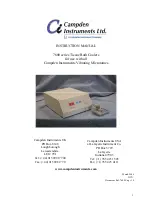
ODPMT200 Series DryLine® Dehydrator User Manual
2
TABLE OF CONTENTS
General Information . . . . . . . . . . . . . . . . . . . . . . . . . . . . . . . . . . . . . . . 3
. . . . . . . . . . . . . . . . . . . . . . . . . . . . . . . . . . . . . . . . . . . . . . . . . .5
Connecting Dehydrator to the Transmission Line. . . . . . . . . . . . . . . . . . . . . . . . . . .8
Parts Replacement and Dehydrator Overhaul. . . . . . . . . . . . . . . . . . . . . . . . . . . . 10
Troubleshooting. . . . . . . . . . . . . . . . . . . . . . . . . . . . . . . . . . . . . . . . . 13
Replacement Parts . . . . . . . . . . . . . . . . . . . . . . . . . . . . . . . . . . . . . . . 16
Customer Service . . . . . . . . . . . . . . . . . . . . . . . . . . . . . . . . . . . . . . . . 16
Figure 5 - Hole pattern for locateing J bolts in cement slab. . . . . . . . . . . . . . . . . . . 19
Summary of Contents for DryLine ODPMT200 Series
Page 14: ...ODPMT200 Series DryLine Dehydrator User Manual 14 Figure 3 Schematic With All Options ...
Page 15: ...ODPMT200 Series DryLine Dehydrator User Manual 15 Figure 4 Alarm s ...
Page 18: ...ODPMT200 Series DryLine Dehydrator User Manual 18 This page was left blank ...
Page 20: ...ODPMT200 Series DryLine Dehydrator User Manual 20 This page was left blank ...



































